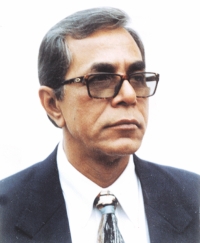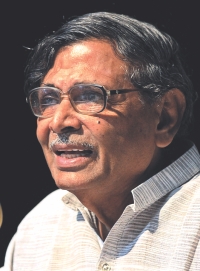| Home - Back Issues - The Team - Contact Us |
 |
| Volume 11 |Issue 25| June 22, 2012 | |
|
|
Current Affairs Good Housekeeping Without an active role of the Speaker and senior MPs, it is difficult, if not impossible, to maintain the sanctity of the Parliament Shakhawat Liton
Given the country's polluted political culture, it was a laudable step by Speaker Abdul Hamid when, on June 10, on behalf of the Parliament, he regretted the “unwanted discussion” of criticising noted litterateur Prof Abdullah Abu Sayeed in the House and the use of “unparliamentary words”. In a rare ruling, the Speaker also said: “Professor Abdullah Abu Sayeed is a respected person of this country. Therefore, I will expunge from parliament proceedings all the unparliamentary words used in the discussion on him.” Jatiya Party MP Mujib-ul-Haque Chunnu, also in a rare gesture, phoned Prof Sayeed on June 5 and offered his apology for the remark he made on him in Parliament on June 3. Earlier, Chunnu and two other lawmakers Fazlul Azim and Sheikh Fazlul Karim Selim had come down hard on Abdullah Abu Sayeed for his alleged derogatory remarks about the ministers and MPs. AL MP Ali Ashraf, who was presiding over the sitting, demanded an unconditional apology from Professor Sayeed. Chunnu acknowledged his mistake and it would have been much better had he used the Parliament floor to express his regret. Three other MPs however said nothing to this effect. The image of the Speaker and of the Parliament as well would have brightened had the Speaker expunged the entire proceedings of the unwarranted discussion. In fact, it should have been expunged as the entire discussion was based on some false reports published in a couple of dailies. The Speaker in his ruling said the reports were baseless and Prof Sayeed did not make such comments about the ministers and MPs. But he defended the MPs who criticised Prof Sayeed and said the lawmakers spoke on the basis of newspaper reports. Haven't MPs often abused their privileges and immunity? MPs in many prominent parliaments enjoy absolute and unqualified immunity relating to their speeches in parliament. They are completely protected from any proceedings in any court even though the words uttered by them in the House may be false and malicious. Though a speech delivered by a lawmaker in the House may amount to contempt of court, no action can be taken against him in a court of law as speeches made in the House are privileged. MPs are supposed to use their privileges and immunity for the interest of the parliament and the people. In the UK, it is settled since the Bill of Rights was enacted in 1689 that members of Parliament have absolute freedom of speech for debates and proceedings in the House. The article 9 of the Bill of Rights, 1689 reads: “The freedom of speech and debates or proceedings in Parliament ought not to be impeached or questioned in any Court or place out of Parliament.” In the Constitution of the United States of America, which was adopted in 1787, the section 6 of Article I provides: “The Senators and Representatives…..for any speech or debate in either House, they shall not be questioned in any other place.”
The Constitution of India, Article 105 (2) more or less employs the same language to address the issue. It says “No member of Parliament shall be liable to any proceedings in any Court in respect of anything said or any vote given by him in Parliament or any Committee thereof, and no person shall be so liable in respect of the publication by or under the authority of either House of Parliament of any report, paper, votes or proceedings.” “In the past, Members were frequently called to account and punished by the House for offensive words spoken before the House. Some have been admonished, others imprisoned and in the Commons some have been expelled,” Erskine May wrote in his book, “Parliamentary Practice.” The situation has improved immensely in modern times. Nowadays the disciplinary powers of privileges are not normally resorted to in the Commons. MPs are more aware of the situation and they use words very carefully when they speak. They try to uphold the honour of the right and privileges which their predecessors could not achieve easily. In fact, the privileges enjoyed in Westminster systems such as Australia, New Zealand, Canada, the UK and elsewhere are, in their origins, the products of an actual political struggle between the House of Commons and the Crown (and the House of Lords) in the United Kingdom. In India, MPs are not allowed to abuse their privileges. The Parliament has taken actions in the past against some MPs for their misconduct in the House. But in Bangladesh, the situation is unparallel and unique – MPs frequently abuse their privileges. Unruly behaviour in parliament and controversial activities of some MPs have tarnished the dignity of the House to a large extent. Newspapers have also run numerous reports over many MPs' other unlawful and controversial activities in other constituencies as well. The way many MPs behave inside parliament demeans the dignity of the House, to say nothing of their interest in parliamentary proceedings. There are numerous incidents which demonstrate how MPs have abused the privileges and immunity for their personal interests and launch abusive words against their political opponents. Whenever the ruling and opposition MPs have had a face off in the House, the situation has become tense. The use of unparliamentary words by some lawmakers was termed shameful by the Speaker in March this year. A year before, former law minister Abdul Matin Khasru, upset by the frequent use of indecent and vulgar words in parliament, said on March 22 last year that the language used by some lawmakers are not even used in the "red-light district". But no action was taken against the MPs for using unparliamentary language. Speaker Abdul Hamid in his June 10 ruling however urged legislators, intellectuals, civil society members and the general people regardless of their political affiliation to uphold the dignity of the House. But before urging others to uphold dignity of the House, the Speaker and MPs must take steps so that the sanctity of the House is maintained. If they fail to do so, it will not be able to regain people's confidence. Until the MPs make efforts to honour the House, the speaker's call will not yield any positive result. The rules of procedure of the Jatiya Sangsad provide the Speaker with ample authority to maintain discipline in the House and to take action against any unruly MP. But the Speaker seems unable to take stern action without the support of the senior MPs of both the ruling and opposition benches. For the sake of a healthy atmosphere in the House, MPs must come forward to assist the Speaker to uphold the sanctity of the House by taking steps against any such misconduct of MPs. The writer is Senior Reporter, The Daily Star.
|
||||||||
Copyright
(R) thedailystar.net 2012 |

